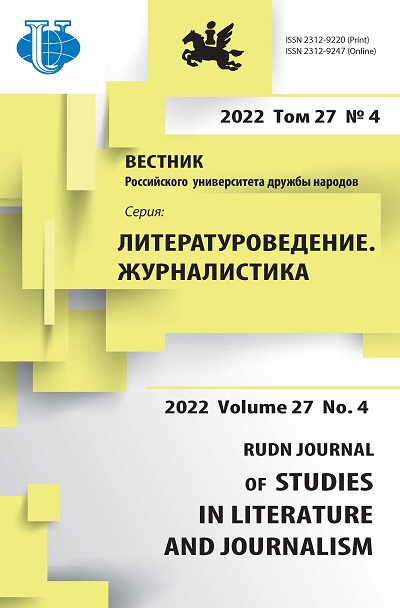Destruction of tolerance in Olzhas Zhanaydarov's play “Aldar”
- Authors: Nechaeva A.L.1
-
Affiliations:
- Lomonosov Moscow State University
- Issue: Vol 27, No 4 (2022)
- Pages: 677-685
- Section: LITERARY CRITICISM
- URL: https://journals.rudn.ru/literary-criticism/article/view/33279
- DOI: https://doi.org/10.22363/2312-9220-2022-27-4-677-685
- ID: 33279
Cite item
Full Text
Abstract
The author deals with the refraction of the category of “tolerance” in O. Zhanaydarov's play “Aldar” through the interpretation of the image of the Migrant Other. The analysis of the work is built from the standpoint of the new drama and communicative violence as one of its main principles. The depiction of a migrant in the play is subject to a number of characteristics that contribute to the overall idea - to reflect acute inequality, global chaos, and the deconstruction of moral attitudes. Hence, the concept of tolerance undergoes complete decomposition, degradation - destruction. The discourse of the Other allows the playwright to narrate on the basis of a performative principle using a certain cultural code, which is also considered as the Other. By constructing a character's conflict with a system that is based on the foundation of violence, the author implements the principle of hyperrealism, which in turn exposes previously hidden problems that corrode society. The Other in this case turns out to be a signal of the need to reshape the “sick,” destructive world order, which is interpreted by society as something self-evident, unshakable. However, whether the Other can become an effective lever for understanding tolerance in its “healthy” meanings by changing the violent, perverted principles of reality - this question has not yet been answered.
Keywords
About the authors
Anastasia L. Nechaeva
Lomonosov Moscow State University
Author for correspondence.
Email: nasteknecha1@rambler.ru
ORCID iD: 0000-0003-4690-2723
postgraduate student, History of Modern Russian Literature and Modern Literary Process Department
1 Leninskiye Gory, Moscow, 119234, Russian FederationReferences
- Asmolov, A.G., Soldatova, G.U., & Shajgerova, L.A. (n.d.). About the meanings of the concept of tolerance. (In Russ.) Retrieved February 26, 2022, from https://asmolovpsy.ru/wp-content/uploads/2022/11/o-smyslah-ponyatiya-tolerantnost.pdf
- Bakhtin, M.M. (n.d.). The author's problem. Author and hero in aesthetic activity. (In Russ.) Retrieved February 26, 2022, from http://www.infoliolib.info/philol/bahtin/5_1.html
- Gogol, N.V. (n.d.). The overcoat. (In Russ.) Retrieved February 26, 2022, from https://ilibrary.ru/text/980/p.1/index.html
- Kozlova, V. (2019). Social theater in modern Russia. Teatr, (40). (In Russ.) Retrieved February 26, 2022, from https://oteatre.info/sotsialnyj-teatr-v-sovremennoj-rossii/
- Levi-Stross, K. (2016). Get to know others. Anthropology and problems of modernity. Moscow: Tekst Publ. (In Russ.)
- Lipovetskij, M., & Bojmers, B. (2012). Performances of violence: Literary and theatrical experiments in “New Drama.” Moscow: Novoe Literaturnoe Obozrenie Publ. (In Russ.)
- Rudnev, P. Aldar. (In Russ.) Retrieved February 26, 2022, from https://pavelrudnev.livejournal.com/2331866.html
- Sartr, Z.P. (n.d.). Being and nothing. The experience of phenomenological ontology. (In Russ.) Retrieved February 26, 2022, from http://psylib.org.ua/books/sartr03/index.htm
- Tolstoj, L.N. (n.d.). Patriotism and government. (In Russ.) Retrieved February 26, 2022, from https://tolstoy.ru/online/online-publicism/patriotizm-i-pravitelstvo/index.xhtml?ysclid=l2ten8u7an
- Zhanajdarov, O. (n.d.) Aldar. (In Russ.) Retrieved February 26, 2022, from https://lubimovka.art/zhanaydarov
Supplementary files















